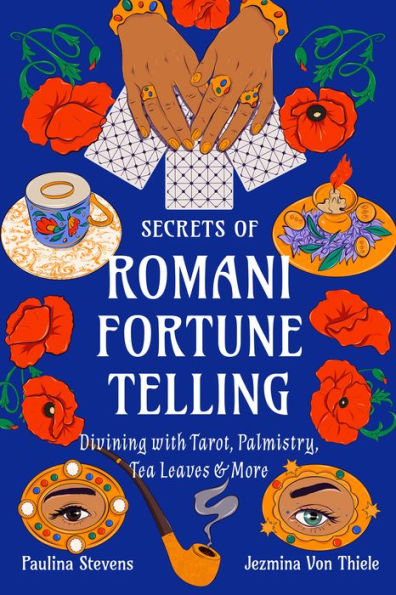Authors Paulina Stevens and Jezmina Von Thiele describe their work, more broadly than fortune-telling, as a “guide for survival in a tough world.” They co-host of a podcast about Romani identity and culture, called Romanistan, for “an imaginary land for the Romani people to belong to, wherever they are in the world.”
This book is in part an information-packed compendium of how-to’s about dream work, palmistry, tarot, tea-leaf and coffee ground reading. It’s also about how these intuitive practices have been integral to the survival of Romani people, and how the authors themselves grew up and live as Roma, in different ways.
Romani is the correct term for a diasporic ethnic minority group that began migrating west from India in about the 11th century, settling all over Europe and also in the United States. The Roma have historically been called “gypsies.” It’s an ethnic slur, but one that the authors embrace because they’re interested in re-claiming it. “Fortune-telling,” too, is a disparaging term, used to cast shade on divination practices that have historically been more popular with ordinary people than with the rich and powerful.
Paulina Stevens’ family comes from the Muchwaya Romani clan which had settled mostly in Serbia. She grew up in various parts of California where her family’s homes often doubled as the local metaphysical shop. As a child, she learned the arts of divination. As an adult, she became a holistic health professional. Jezmina Von Thiele is a professor, writer and performance artist who offers tarot, palm and tea-leaf readings. She identifies as queer and nonbinary. She calls her Romani background “mixed” and “assimilated” because only one of her grandparents descended from the Roma. This was her maternal grandmother, who grew up in Germany during the Holocaust. It should never be forgotten that the Nazis murdered an estimated one million or more of the Roma people.
Stevens and Thiele write that the mission of their podcast (and this book) is not to present “model Roma” but, instead, to platform the diversity of Romani people and cultures, including as people who embody “the rebel or outcast archetype.” On the podcast, they “speak out against the hard issues the Romani community faces, such as the normalization of domestic violence, crime, sexism, arranged teen marriage, the exclusion of GLBTQIQ+ Roma, and the like.”
The book is both a practice guide and a very general overview of Romani history and culture, which makes it a pleasure to read. There are instructions for dream work, palmistry, tarot, tea and coffee ritual. There’s an emphasis on cultivating one’s intuition in one’s own unique ways. There’s a chapter on the ethics and interpersonal dynamics of fortune-telling.
If there’s a “secret” to Romani fortune-telling, it’s that for centuries of Romani history, divination practices have been both a necessary job and a spiritual practice.
The Romani coalesced as an ethnic minority group in northern Indian and Pakistan in the 10th and 11th centuries when India was fighting Muslim invaders. India deployed Romani men as soldiers because the Romani people were ranked as a low caste in the Hindu system. After India lost its wars, many of the Roma were taken prisoners by Muslim conquerors. Many other Romani people fled with their families and migrated west. Because Romani people are dark-skinned, historically have worshiped many gods, and speak languages related to Sanskrit, they’ve found themselves persecuted within white European societies wherever they’ve gone. Fortune-telling became one of their survival means of livelihood, though not uniformly. In fact, the authors explain, fortune-telling has also carried a stigma among some of the Roma, both because it has been seen as economically desperate and because it has been primarily “women’s work.”
The authors are brief on the question of whether Romani fortune-telling is akin to witchcraft. “There is a tradition of witchcraft and magic among some Roma,” they write, “but it can be very divisive, and that is exactly the kind of closed practice that we will not be sharing.” The authors are also not keen on the slew of “gypsy fortune-telling” books out there written by non-Roma people. Much of this material reinforces negative stereotypes, to say the least.
The authors only barely touch on the breadth and depth of Romani spirituality, except to say that many Romani practice syncretic religions, blending uniquely Romani beliefs and practices with the dominant religions where they live, be that Catholicism, Judaism, Islam, or Zoroastrianism. The Roma people’s best-known deity may be Sara la Kali (also known as Kali Sara, Saint Sarah, Black Sarah, and Black Madonna.) She’s a dark-skinned mother figure, likely a blend of the Hindu goddess Kali and the Christian Madonna.
Adaptation and cultural blending, for Roma and other diasporic groups (Jews, African Americans, Irish and others) has been key to survival. The Roma continue to endure economic deprivation and violence in some parts of the world. In the United States, the authors themselves have faced public harassment because they look “ethnically ambiguous” and particularly when bigots have called them out as “gypsies” in public places.
What I found most compelling about this book is the connections the authors make between cultural survival and the preservation of intuitive practices. They conclude that learning to “read a room,” to listen well, to take chances, and to trust one’s instincts are necessary life skills for making it amidst hostile social conditions. These are skills for everyone to cultivate during these perilous times.
~review by Sara R. Diamond
Authors: Paulina Stevens and Jezmina Von Thiele
Red Wheel/Weiser, 2024
224 pp., $18.95

